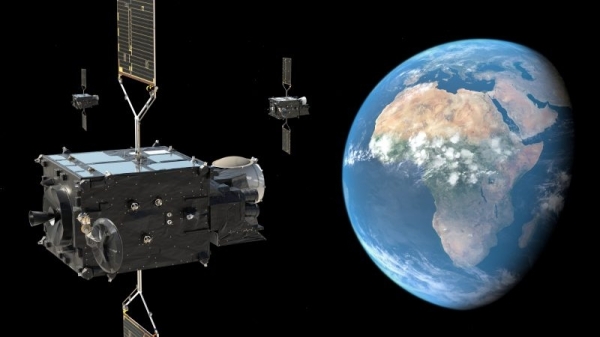EU space programme, Green Deal endangered by Brexit vacuum

Brussels and London’s failure to agree on post-Brexit arrangements endangers the European space programme, with the first victim possibly being the monitoring of the EU Green Deal, if no solution is found by mid-2024, EURACTIV has learnt.
When the UK left the EU in 2020, London wished to keep participating in the EU’s Copernicus programme, which observes and monitors the planet’s environmental evolution via satellites from space.
However, until a solution was found over the implementation of the Northern Ireland Protocol, both sides could not address arrangements for Horizon Europe – and, by extension – the UK’s participation in Copernicus.
Consequently, the UK never paid its €721 million contributions to the space programme over the 2021-2027 timeframe, the European Space Agency (ESA) pointed out in an internal note seen by EURACTIV.
After the signing of the Windsor Agreement in March and the settlement over the Northern Ireland issue, “both the UK and the EU have been clear that we are open to taking forward discussions on UK association to EU programmes”, a UK Government spokesperson told EURACTIV.
“However, discussions on a way forward will need to reflect the reality that we have missed over two years of participation in the programmes”, they added.
It still needs to be determined what rebate the UK could ask for to compensate for its inability to participate in the space programme for the past two years.
Copernicus at risk
Meanwhile, the missing money from the funding gap has “a major impact on the Copernicus Space Component”, ESA has warned.
In particular, the Copernicus financial gap “substantially jeopardises the enhanced continuity of the [Copernicus] Programme and its capability to fully and timely support the EU Green Deal”.
The future generation of Copernicus satellites, which would contribute to the EU’s goal of reaching climate neutrality by 2050 via the so-called Sentinel Expansion Missions, would be the first impacted by the delay in the UK’s lacking financial contribution.
The missions include six satellites, including Copernicus Anthropogenic Carbon Dioxide Monitoring (CO2M), which is meant to give the EU the means to measure CO2 emissions by human activities on every level.
Other Copernicus missions already in orbit and use are also at risk, the ESA document states.
For the currently flying Sentinel missions, delays in the budget until 2028 would “reduce the flexibility and capacity of the operation to satisfactorily respond to programme needs and user expectations”, among other issues.
In disaster management, it would “substantially reduce the capacity, in particular, to respond to emergency needs related to disaster management”, citing potential issues with “very high resolution optical and radar data”.
Deadline mid-2024
To keep the programme developing, the missing contribution would have to be “made available at a later stage but no later than June 2024”, the ESA note adds.
If the recovery of the funding gap were to only happen in the next phase of the EU’s budget (2028-2034), it would “create years of interruptions in the development of the satellites and therefore substantially delay their availability to support relevant EU policy needs”, the note says.
This would also “substantially increase the cost of the programme”, it adds.
As a solution to avoid risking the entire constellation of satellites, ESA advises that “since the gap needs to be recovered before mid-2024, the last funding opportunity is identified in the mid-term review of the MFF”.
The European Commission indicated it would propose a review of the EU’s current multi-annual budget cycle before summer, but negotiations between member states on contributions could take several months.
Member states agreeing to have a review of the MFF is “not sure”, MEP Christophe Grudler (Renew, France), in charge of the European Parliament’s space programme file, told EURACTIV.
In his view, “the UK has to pay the entirety of its contribution since it will eventually benefit from the satellites’ services, as it wishes”.
“Until now, the programme did not suffer; the budget was directed into the first few years”, he said, adding that this way, the UK contribution would simply close the gap in the last years until 2028.
According to the rapporteur, if that was to fail, another option would be to use the EU budget or ESA’s own funds.
The UK, meanwhile, has been looking at alternative programmes that could be launched rapidly if needed, EURACTIV understands.
It has also constantly reminded the EU that its researchers and businesses had been entirely excluded from the programmes over the past two years.
“Following the Windsor framework, discussions are underway on the possible association of the UK with Copernicus. This discussion will continue in the context of the UK’s possible participation in certain EU programmes, such as Copernicus”, a European Commission official told EURACTIV.



